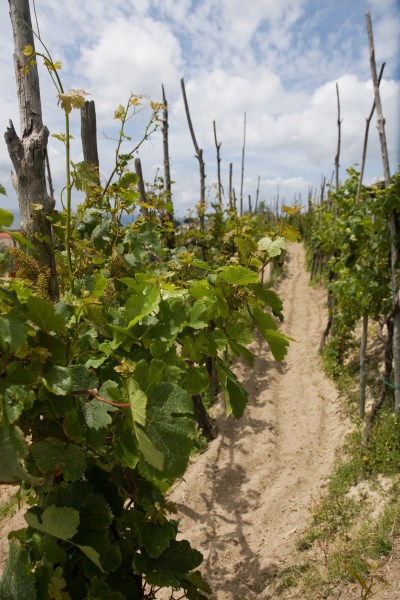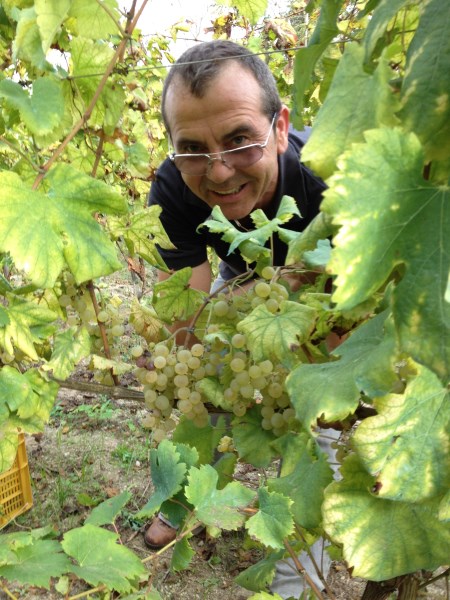History of Falanghina
Falanghina is a native valuable vine from the ancient, noble, glorious traditions: vigorous and productive, resulting from greek-Balkan strains, was introduced in Campania region by Aminei, pelagic people.

Distinguished between a Sannio and Campi Flegrei biotype, Falanghina occupies a central place in the Campania wine, from all points of view: production, territorial and economic. It ‘s the most widely grown white grape vine in the region, with over 2,000 hectares of vineyards surveyed (two-thirds in the province of Benevento), share surpassed only by the surfaces intended Aglianico *.
It is present in all provinces and in all the major producing areas. It is the vine that produces the greatest turnover in Campania for at least fifteen years, with over 150 manufacturers who have in their range at least one white-based Falanghina, not counting bottlers.
Currently, it covers an area equal to 5% of the regional vineyard: the areas most suited to the production are the Sannio Beneventano, the Campi Flegrei and Caserta.
Distinguished scholars, such as Frojo and Fiorito, identified in falanghina the ancestor of Falernum Gauranum, famous as the wine of the emperors, praised by Plinio il Vecchio (Pliny the Elder). It was celebrated by famous poets, inevitable on sumptuous banquets of the magnificent royal court of Naples and inserted into prestigious papal charter of wines; Acerbi, in 1825, mentions him among the “finest proponents of the sublime pleasures of the throat”.
The name derives from the Latin phalanx or falango , falange and falanga. A stake to which the vines were incurred according to the farming system of Pozzuoli, still widespread, typical of the ancient Greeks burning fields, magical land and legendary, epic background of that age.
Serving Falanghina

Seductive wine product, intact expresses its class tradition in vinification. Served between 46 and 50 degrees is an excellent white wine, straw yellow with greenish reflections. At the nose it opens in a rich aromatic range of delicate floral and fruity perfume, intense and persistent with hints of broom, flowers of the Mediterraneo, banana, green apple, pear, almond, elderberry and basil. The taste is dry, fresh, harmonious and smooth, with good acidity; the bitter aftertaste, pleasant and spacious, recalls the pomegranate.
Excellent served as an aperitif, excellent accompaniment to traditional Mediterranean dishes: appetizers, rice and pasta with seafood, shellfish, delicate sauces, vegetable soups, soups with mushrooms, grilled and fried fish, white meats, soft cheeses , young goats, mozzarella di bufala, assorted pizzas, and vegetable flans.
Thanks to its excellent value for money, Falanghina has had a huge spread in recent years. The fundamental difference between the Falanghina del Sannio and the Campi Flegrei is the type of soil in which it is produced. The first is grown on rocky ground but rich, the second one is cultivated in a volcanic area whose soil is rich in minerals like sulfur. Another difference between the two is that the Falanghina of Campi Flegrei is grown near the sea and benefits from the iodine. Falanghina of Sannio instead is produced within the Campania region. It is clear that the two Falanghina present slight differences in taste due precisely to the place where they are grown.
Sintema – Falanghina dei Campi Flegrei Cantine Babbo

Light straw yellow, the nose is very clean and with a pleasant end of herbaceous and floral notes. Sip dry and light, very pleasant.
The winery of Mr. Tommaso Babbo is located in the Campi Flegrei area and precisely in the sub area of Scalandrone. The location faces the Tirreno sea on one side and the lake D’Averno on the other side which is a volcanic lake close to the Sibilla Cumana mentioned in the Eneide of Virgilio.
Mr. Tommaso Babbo grows his grapes with the biodynamic technique .Through biodynamic agriculture he believes it will best express his plants. With an eye to astrological influences on the plants and on the ground working to put these in the right inter-connection. In the vineyard, or rather across the enterprise, from a limited and respectful use of tractors, sowing of green manure practices, banned chemical pesticide, he assures to re-establish the right connection between the sky and the ground .
He uses preparations that trigger a process of formation of humus and stimulators of light and heat functions. Instead of fighting the diseases, he triggers mechanisms to create health, reversing the logic of modern industrial agriculture.
Behind the wine you find on the shelf, there could be a great passion and love for the wine. The history of Falanghina and the unique way in which Mr. Babbo feels his wine , its energy and its connection to the sky and the ground, lead us to choose the winery Cantine Babbo and import Sintema Falanghina in Florida as one of our finely selected wines.
Falanghina belongs to our line “Wines of Pompei”
Mediterraneo Italian Wine Import and Distribution – Florida

